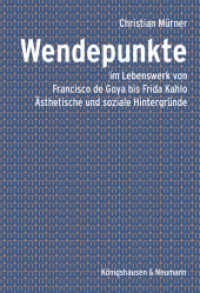- ホーム
- > 洋書
- > 英文書
- > History / World
Full Description
Republican Citizenship in French Colonial Pondicherry, 1870-1914 revisits and analyses the earlier part of the Third Republic, when France granted citizenship rights to Indians in Pondicherry. This work of historical sociology explores the nature of this colonial citizenship and enables comparisons with British India, especially the Madras Presidency, as well as the rest of the French empire, as a means of demonstrating how unique the practice of granting such rights was. The difficulties of implementing a new political culture based on the language of rights and participatory political institutions were not so much rooted in a lack of assimilation into the French culture on the part of the Indian population. Rather, they were the result of political infighting and long-term conflicts over status, both in relation to caste and class, and between inclusive and exclusive visions of French citizenship.
Contents
List of Diagrams, Graphs, Images, Maps, and Tables, Acknowledgements, 1. Pondicherry in the French Empire during the Nineteenth and Twentieth Centuries,Between Colonial Subjects and French Citizens,I. Overview and General Concepts,II. Analytical Framework, 2. Contextualizing Pondicherry within the French Empire and the Indian Subcontinent,I. Pondicherry within the French Empire,II. Pondicherry within the Indian Subcontinent,III. Pondicherry during the Nineteenth and Early Twentieth Centuries, 3. Inclusive and Exclusive Visions of Citizenship in French India,I. Colonial Pondicherry and Its Entanglement with Imperial Citizenship,II. The Topas, the Renouncers, and the Catholics,III. Institutions,IV. Conclusion, 4. Education and Army,Attempts to Institutionalize Republican Ideals in French India,I. The State of Education in Pondicherry before the Third Republic,Education in Third Republic Pondicherry: A Secular Primary Education for All,III. Civic Education and the Language Policies,IV. Hindrances to the Republican School Project: Race and Caste,V. Hindrances to the Republican School Project: Gender Issues and Budget Constraints,VI. The Armed Forces in Pondicherry,VII. Military Laws, Citizenship, and Indochina,VIII. Conclusion, 5. The Art of Petitioning in a Colonial Setting,I. Law, Order, and a Bureaucracy of Petitions,II. A Deficient Electoral System,III. Attempts to Prevent Electoral Frauds and Appeals on the Ground,IV. Partisan Political Fraud Under the Three-List System (1884-1899),V. Partisan Political Fraud under The Two-List System (1900-1913),VI. Conclusion, 6. From Electoral Politics to Expansion of Rights and National Independence,I. What Conclusions Can We Draw from Republican Citizenship in Pondicherry?,II. How Far Was the Civilizing Mission Applied?,III. From Contestations to Nationalism and the Impact of British India,IV. New Forms of Political Participation in a Comparative Perspective,V. Situating Pondicherry within a Larger Theoretical Reflection on the Relationship between Empire and Citizenship, Bibliography, Index.





